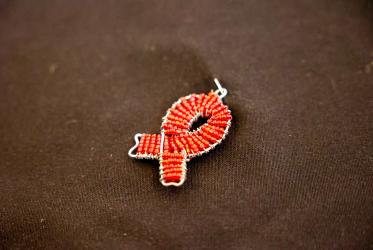Preventing HIV, particularly among adolescents and youth, was the focus of a two-day meeting for 25 Sunday school teachers and chaplains from the Methodist Church of Togo, Evangelical Presbyterian Church of Togo, Assemblies of God, Baptist Convention and Pentecostal Church.
The meeting, held 24-26 February in Lomé, Togo, was organized by the World Council of Churches Ecumenical HIV and AIDS Initiatives and Advocacy (WCC-EHAIA) West Africa regional office.
With a theme of “New strategies of prevention and HIV,” the workshop aimed to raise awareness of new preventive methods, particularly for adolescents and youth. Over two days, teachers and chaplains reflected on how they can holistically reach out to children to ensure they have all needed information during adolescence to be able to make positive choices.
Participants discussed various themes such as HIV prevention in schools and its challenges; sexuality, violence and HIV infection in juvenile environment; and roles of Sunday school teachers and chaplains in HIV response. The workshop intended to provide in-depth knowledge and raised challenges faced by those reaching out to teens, as statistics show that adolescents are now the most affected by HIV.
Education of young girls continues to be a challenge as the rate of early pregnancies in primary and secondary schools is very high. In Togo, not only are teens being infected but also many early pregnancies are being recorded. Statistics from press reports in 2013 indicate that only 29% of girls reach secondary schools while 72% of boys continued their schooling. In the six regions in Togo, between 2010 and 2012, out of 5,443 pregnancies, 230 were recorded from primary schools. Sunday school teachers and chaplains reflected on these statistics and how they underscore the importance of their roles in helping adolescents and young people protect themselves.
Among the many questions during the workshop, a major one was: “Is the family still a safe space for the young girl, as it seems the family has failed in its role of prime educator of the girl regarding her sexual and reproductive health?”
Chaplains and Sunday school teachers should aim to help adolescents and youth respond appropriately to their challenges.
Chaplains are more and more marginalized, while they are meant to be an epicenter where adolescents and young people from churches find solace, observed participants.
Chaplains were identified as key helpers for young people who are going through stress and learning about appropriate attitudes. Chaplains should be considered as key to helping churches develop strategies and solutions, said participants.
“If, as Sunday school teachers and chaplains, we are able to save one child, it is a whole population that is saved,” said Rev. Etienne Amedodji, a chaplain from the Evangelical Presbyterian Church of Togo.
Contextual Bible study helped participants create a safe space to discuss adolescents and youths in a situation of violence. In the Bible, the case of Tamar in 2 Samuel 13:1-22 was juxtaposed against the experience of Zouhoura, a young girl from Chad who was raped on the 13 February by a gang of five young boys. This created a rich debate on measures to prevent such violence in the society and the church.
The workshop ended on a positive note with leaders committed to take action in churches and schools — both public and private — to raise the alarm on the importance of comprehensive education about sex, violence and HIV.
More information: Ecumenical HIV and AIDS Initiatives and Advocacy (EHAIA)







